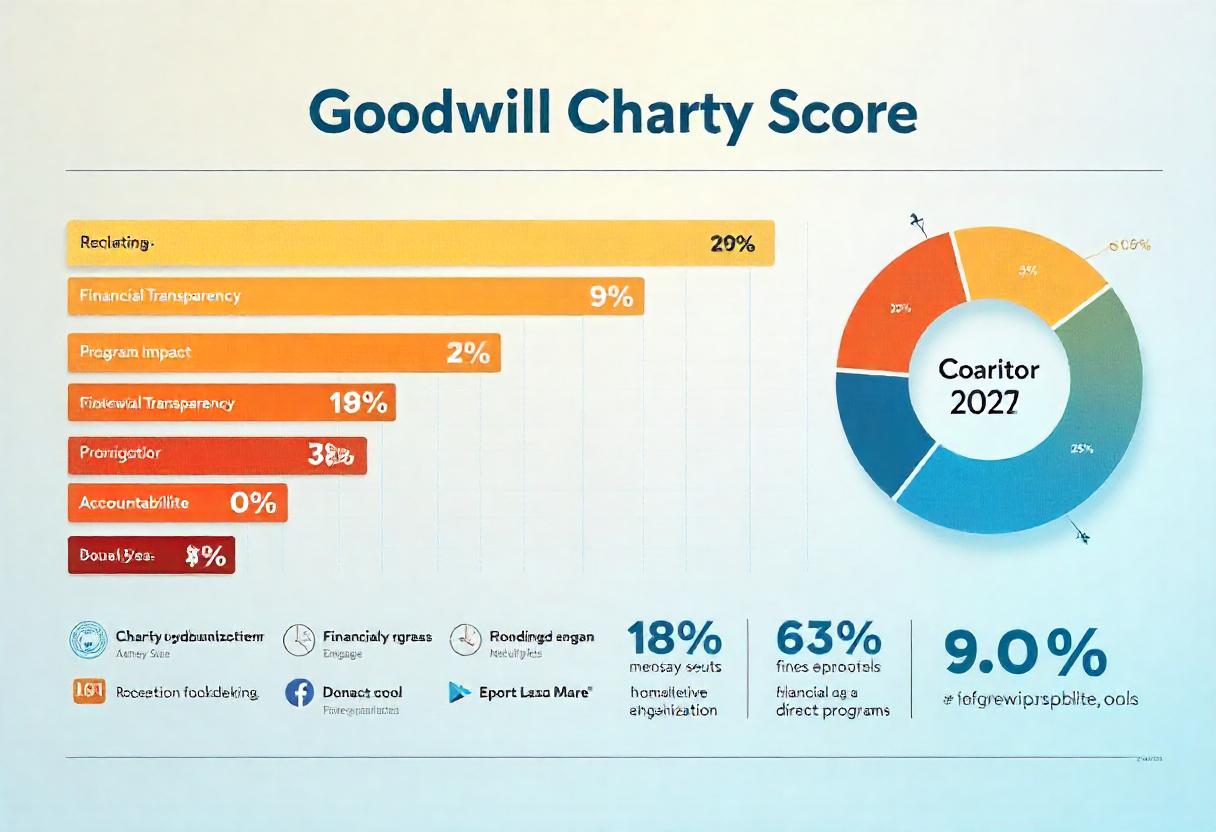NEWS
Goodwill Charity Score: Evaluating the Impact of Your Donations

Donating to charity is an act of kindness, but how do you ensure that your contributions are truly making a difference? This is where the Goodwill Charity Score comes into play. It evaluates the effectiveness, transparency, and accountability of nonprofit organizations, guiding donors in making informed decisions.
With numerous charities operating globally, understanding their financial and operational efficiency is essential. This guide explores the Goodwill Charity Score, the criteria used for rating charities, and how you can use this information to make impactful donations.
What is the Goodwill Charity Score?
The Goodwill Charity Score is a nonprofit evaluation metric that assesses the efficiency and transparency of charitable organizations. It helps donors determine whether their contributions are being used effectively.
This rating system considers factors like financial accountability, administrative expenses, program funding, and ethical operations. Organizations that score high demonstrate responsible financial management and a commitment to their mission.
Why is a Charity Score Important?
A charity score ensures that your donation supports causes that allocate funds wisely. Some nonprofits spend excessive amounts on executive salaries and marketing rather than on direct aid. By reviewing a charity’s score, you can:
- Ensure Transparency: Verify how donations are utilized.
- Measure Impact: Understand the real effect of your contribution.
- Avoid Fraudulent Charities: Identify organizations that misuse funds.
- Encourage Accountability: Promote responsible management in the nonprofit sector.
How is the Goodwill Charity Score Calculated?
Charity rating organizations like Charity Navigator, BBB Wise Giving Alliance, and GuideStar use the following criteria to evaluate nonprofits:
1. Financial Health
- Percentage of funds allocated to programs vs. administrative costs.
- Debt-to-income ratio and revenue growth.
- Stability and sustainability of funding sources.
2. Transparency and Accountability
- Public disclosure of financial statements.
- Ethical fundraising practices.
- Board oversight and governance.
3. Impact and Effectiveness
- Success of programs in achieving their mission.
- Measurable results and long-term benefits.
- Community engagement and outreach efforts.
4. Leadership and Governance
- Board independence and leadership structure.
- Executive compensation compared to industry standards.
- Conflict of interest policies and ethical guidelines.
How Goodwill Industries Scores on Charity Rating Platforms
Goodwill Industries International, one of the most well-known nonprofit organizations, often receives mixed ratings.
- Charity Navigator: Goodwill’s rating varies based on regional branches. Some receive high scores for financial transparency, while others have lower scores due to executive salaries.
- BBB Wise Giving Alliance: Many Goodwill branches meet all 20 BBB accreditation standards.
- GuideStar: Goodwill is rated as a Platinum-level transparency organization in some areas but has also faced scrutiny regarding labor policies.
While Goodwill provides valuable employment training and community support, it is crucial to research your local branch to ensure donations are being used effectively.
How to Check a Charity’s Score Before Donating
Before making a donation, you should:
1. Research the Charity Online
- Visit websites like Charity Navigator (charitynavigator.org) and BBB Wise Giving Alliance (give.org).
- Look up tax-exempt status through the IRS Exempt Organizations Select Check.
2. Review Financial Statements
- Check annual reports and Form 990 filings.
- Analyze program spending vs. administrative costs.
3. Assess Transparency and Governance
- Look for clear mission statements and impact reports.
- Avoid organizations that withhold financial details.
4. Read Donor Reviews and Complaints
- Check platforms like Glassdoor for employee insights.
- Look for complaints on Better Business Bureau (BBB).
How to Ensure Your Donation Has the Most Impact
- Give Directly to Programs: Avoid charities with high administrative costs.
- Support Local Nonprofits: Community-based charities often allocate more funds to direct aid.
- Volunteer Instead of Donating Money: Time and skills can be as valuable as financial contributions.
- Set Up Recurring Donations: Monthly contributions provide stable funding for nonprofit initiatives.
Also read: Brother Nathanael: The Controversial Voice in Modern Discourse
Red Flags to Watch for in Low-Scoring Charities
Some charities may have low scores due to financial mismanagement or ethical concerns. Avoid organizations that:
Spend less than 50% of donations on actual programs.
Lack transparency or fail to publish financial statements.
Have high CEO salaries that exceed industry standards.
Use aggressive telemarketing or pressure tactics for donations.
If a charity falls into these categories, consider finding an alternative that prioritizes mission-driven work.
Conclusion
The Goodwill Charity Score is a crucial tool for evaluating nonprofit organizations. By researching a charity’s financial health, transparency, and impact, you can ensure your donations make a meaningful difference.
Before giving, take the time to review charity ratings, financial reports, and donor reviews. With informed giving, you contribute to a better, more accountable nonprofit sector.
FAQs
How can I find the Goodwill Charity Score for my local branch?
Visit Charity Navigator, GuideStar, or BBB Wise Giving Alliance and search for your local Goodwill branch. Ratings may vary by location.
Does a high Goodwill Charity Score guarantee a good nonprofit?
Not necessarily. While a high score indicates strong financial and governance practices, you should still research the charity’s impact and mission alignment.
Why do some charities have low ratings despite good work?
Some nonprofits spend more on overhead costs like marketing or salaries, reducing the percentage allocated to programs. Others may lack transparency in financial reporting.
Are all Goodwill locations run the same way?
No, Goodwill locations operate as independent franchises. Some branches have high ratings, while others face criticism for executive pay and employment policies.
What percentage of donations should go to programs?
Ideally, at least 75% of donations should go directly to programs. High-performing charities allocate 85% or more to their cause.
Can I trust telemarketing calls from charities?
Be cautious. Many telemarketing firms keep a large percentage of donations. Research the charity before giving over the phone.
How do I report a fraudulent charity?
You can file a complaint with the Federal Trade Commission (FTC) or report concerns to BBB Wise Giving Alliance.
-

 HUMAN RIGHTS5 months ago
HUMAN RIGHTS5 months agoMercy Ships Scandal: Unraveling the Truth Behind the Allegations
-

 SOCIAL AWARENESS5 months ago
SOCIAL AWARENESS5 months agoIs Helping Hands Legit? Unveiling the Truth Behind This Organization
-

 HUMAN RIGHTS6 months ago
HUMAN RIGHTS6 months agoHuman Rights Issues: Challenges and Progress in a Globalized World
-

 SOCIAL AWARENESS5 months ago
SOCIAL AWARENESS5 months agoNational Charity League: A Legacy of Leadership and Service
